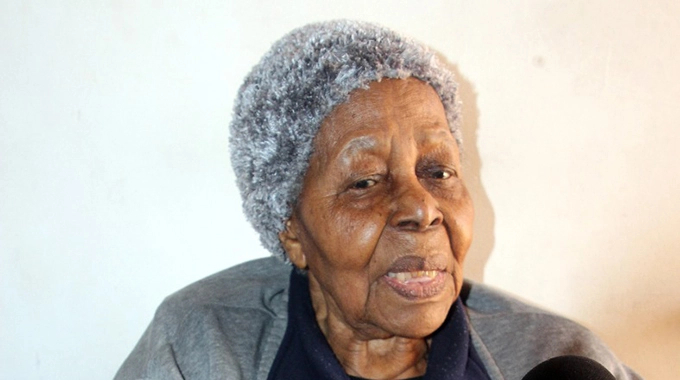By Brooks Marmon
In the course of my PhD research in Zimbabwe in 2017 and 2018, I conducted some three dozen interviews, focusing on the early stages of the country’s liberation struggle. However, there was no one I met who sounded more like a straight-talking revolutionary than Jane Ngwenya.
In our second and last meeting, she immediately opened by telling me of her dislike of the British – I am American but am sure she recalled that I was then a PhD student based in the UK.
Jane Lungile Ngwenya was born on 15 June 1935. She was raised in Buhera, the daughter of a migrant from Lesotho and a mother of Shona background. She was a polyglot who in addition to languages more common to Zimbabwe, spoke Bemba and Chichewa, which served her well during nearly a decade of exile life in Zambia.
At the time of her recent passing due to complications from covid, Ngwenya was one of the most senior surviving members of the Zimbabwe Liberation Movement. She was named to the National Council of the NDP in October 1960 alongside figures like Robert Mugabe and Joshua Nkomo.
Unlike many, she did not attribute her politicisation to external influences or education. Rather, as she told me, attempts by white Rhodesians to confiscate her grandfather’s land and cattle, which resulted in him being arrested numerous times, “did not go well with me in my heart.”
Before embarking on her career in politics, Ngwenya briefly served as a teacher, having attended school to Standard 6. She told me that she did not enjoy the profession as “schools were only to make an African listen to a white person.” She then turned to dressmaking.
When she moved to Bulawayo with her then husband, she became more active in politics. One day, following church, she stopped to listen to an address by the noted nationalist Benjamin Burombo.
Unaccustomed to women taking an interest in politics, Burombo asked if she was lost (she gave a slightly different account of the experience to Mhoze Chikowero). From then on, she was determined to become more active in politics. She attempted to avoid being shunted into Women’s Groups as she didn’t think they were particularly important.
However, she also felt that “men had nothing to do, they lived for talking.” Ngwenya became determined to speak out against the situation in the British colony and challenge gender stereotypes through her action.
When the white government declared a state of emergency in 1959, she was arrested. She recalled that at this relatively early stage of the struggle, the men were terrified of being arrested. She told me that she had not been a member of the SRANC, the political party that was outlawed as part of the emergency declaration, but had attended its meetings.
However, when a new party, the NDP, was formed on New Year’s Day, 1960, she was present as a founding member.
By 1961 she became integral to the NDP’s attempts to internationalise the liberation struggle. She was part of the party’s delegation to the All Africa People’s Conference in Cairo, Egypt that year. After the conference, she did not return to Zimbabwe but travelled to the UK, China, and Yugoslavia. Her last son was born in Moscow while she was en route to Mongolia on party business.
As she told me, “We were then in touch with the world. We were no longer an isolated island for the British to have us as slaves.”
She would be repeatedly detained until 1970, receiving hard labour sentences. She was smuggled into exile in Zambia the following year. She was injured there in the same explosion that killed Jason Moyo, the ZAPU leader in exile, in 1977.
She remained with ZAPU following the 1963 split, but joined ZANU soon after independence (before the Unity Accord) and became a Deputy Minister. She left Parliament after her first term due to health reasons.
In our second meeting, half a year later and shortly before the 2018 election, she opened up further, sharing her views on governance and key figures in the liberation struggle.
She compared Emmerson Mnangagwa to Sekou Toure of Guinea (favourably). She spoke of her admiration of Mugabe (this was a departure from our first meeting, days after Mugabe’s resignation when she implicitly criticised him for overstaying in office). She noted that her close friendship with Sally Mugabe (the two travelled together to west Africa in 1961) had unsettled some in ZAPU. She was more directly critical of Leopold Takawira’s ambition to displace Joshua Nkomo as NDP leader.
Despite her professed approval of ZANU’s leaders, she critiqued the party, apportioning most of the blame for the division in the liberation struggle on ZANU, which was “not known in the African world…until 1980.”
She lamented the state of the economy, noting that sanctions had had an impact. She stressed that Zimbabwe’s main need was for stability. She wanted Zimbabwe to pursue policies that would make it eligible for loans, attract foreign development, and revitalise the national currency.
Ngwenya intimated to me that unlike many of her colleagues, she accumulated no great financial benefits when pay-outs were made in the 1990s. Her comfortable, but modest living circumstances in Bulawayo seemed to substantiate this claim.
She told me: “we lived an interesting hard life, we sacrificed….I worked for my country, I’m very proud of it.”
Brooks Marmon is a Fellow in the Department of Historical & Heritage Studies, University of Pretoria

